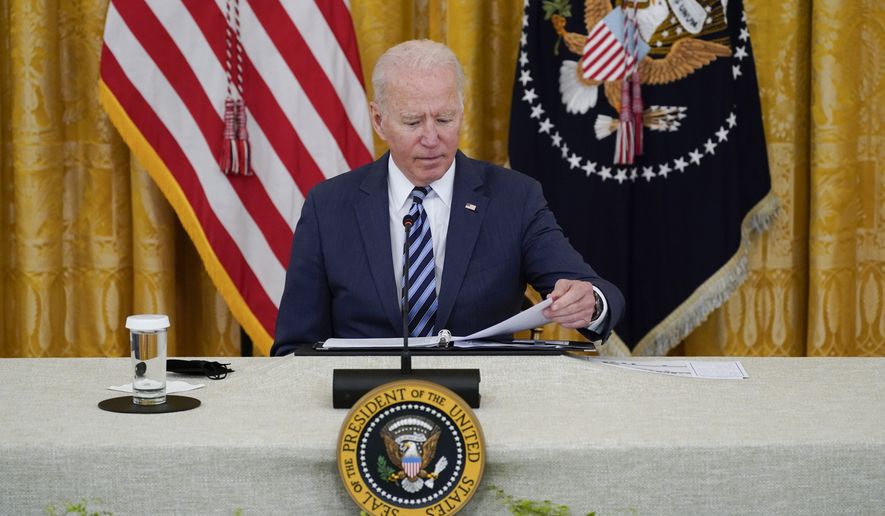President Biden asked executives from major tech companies, banks and other businesses taking part in a White House summit Wednesday to brainstorm solutions to the onslaught of hacks and cyberattacks damaging the country’s economy.
The administration has pursued new public-private partnerships with tech companies amid a crush of attacks hitting critical infrastructure and hacks putting the data of millions of Americans at risk.
The federal government has turned to the private sector to develop new cyber defenses, train workers and create new information-sharing methods that can expedite the response to breaches of computer networks.
“Today, my team is hosting a meeting bringing together 30 of the nations, 30 nations to step up in their fight against ransomware but the reality is most of our critical infrastructure is owned and operated by the private sector and the federal government can’t meet this challenge alone,” Mr. Biden told attendees. “I’ve invited you all here today because you have the power, the capacity, and the responsibility, I believe, to raise the bar on cybersecurity.”
The roster of executives huddling with Mr. Biden and his top officials included CEOs from Apple, Google, Microsoft, Bank of America, JP Morgan Chase and the chancellor of the University of Texas System, among others.
The participants were selected, according to Anne Neuberger, deputy national security adviser for cyber and emerging technology, because of their ability to spur rapid change and get other businesses to adopt new cybersecurity practices.
“For this particular first meeting, we really focused on the companies who can scale security,” Ms. Neuberger said on CNBC. “For example, I often look to Walmart and RFID: When Walmart announced to their suppliers that they were looking for them to track things via radio-frequency identification, that moved an entire sector to automated better tracking. These kinds of companies announcing, for example, that their suppliers need to put in place certain security practices would then move the whole ecosystem.”
A senior Biden administration official told reporters before the summit that the government has previously talked to critical infrastructure entities about avoiding becoming the “next Colonial” in reference to the ransomware cyberattack hitting Colonial Pipeline that led to fuel disruptions and gas lines along the east coast. Now, the government hopes its new meetings and anticipated initiative will pressure many other companies to pursue better security measures.
Ms. Neuberger told CNBC the Biden administration invited 30 countries to participate in an international coalition to fight ransomware and she hoped the banks could give the government ideas about how to better share cyberthreat intelligence information to protect against attackers.
“One of the reasons we invited the banking sector is because they have some of the best cross-sector collaboration on cybersecurity threats both within the sector and with the government and we want to hear from them how we can build that model and take it to other sectors as well,” Ms. Neuberger said.
The government solicited input from the education sector because of a large shortfall in workers filling crucial cybersecurity roles nationwide. Participants from large and small universities were on-hand Wednesday to discuss the training problem that the government has seen coming for some time.
In October 2020, the Department of Homeland Security estimated that the cybersecurity workforce would face a shortage of 1.8 million workers in 2022, up from an estimated 299,000 active openings in 2017. The department gave $2 million last year to a group led by the University of Illinois at Urbana-Champaign to make a plan for the federal government to “build a national network of cybersecurity technical institutes.”
The senior Biden administration official estimated that there are 500,000 cybersecurity jobs open currently, and the government sought input from various schools and educational groups on Wednesday in hopes of filling the gap.
After meeting with Mr. Biden, the participants were scheduled to break into smaller meetings with several members of his Cabinet and national security team, including National Security Adviser Jake Sullivan, National Cyber Director Chris Inglis, and Cybersecurity and Infrastructure Security Agency Director Jen Easterly, among others, according to the White House.
The success or failure of the federal government’s new relationship with the private sector is a test of the administration’s recently installed cybersecurity leadership charged with implementing a national cyber strategy — particularly Ms. Easterly, Mr. Inglis, and Ms. Neuberger.
The administration elevated cyber as a priority on the National Security Council with the selection of Ms. Neuberger to oversee cyber issues at the White House. Mr. Inglis was sworn in last month as the country’s first national cyber director and Ms. Easterly was confirmed by the Senate to run CISA last month.
Since the three officials formally took office, the government has increasingly trumpeted its overt work with the private sector. Earlier this month, CISA took the lead role in establishing a Joint Cyber Defense Collaborative, which is expected to develop defense operation plans with participants from tech companies and federal agencies alike.
The first participating companies in that collaboration included: Amazon Web Services, Google Cloud, Microsoft, AT&T, Verizon, FireEye Mandiant, and CrowdStrike among others teaming up with the Department of Defense, U.S. Cyber Command, FBI, the Office of the Director of National Intelligence, the National Security Agency, and the Justice Department.
• Ryan Lovelace can be reached at rlovelace@washingtontimes.com.




Please read our comment policy before commenting.